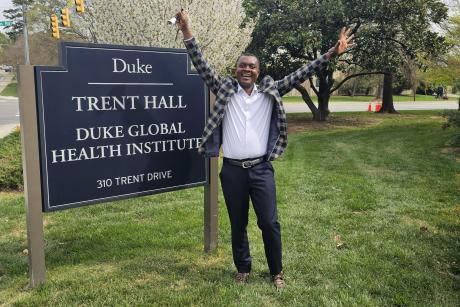There is a small room at the Kilimanjaro Christian Medical Centre (KCMC). It holds a table, a coffee machine, a couple of utensils and a huge green thermos that’s always filled with tea. It overlooks a lovely garden, and often, you will find student nurses and staff engaged in animated conversation with each other. I love that room; it is a cheerful room.
The other rooms in the center don’t quite hold the same cheer. They have an air of urgency and somberness that that causes voices to hush and steps to quicken as people approach. In these rooms, men, women and children receive treatment for various cancers. My workstation, the cancer research office, faces one of the wards for male patients, and the quiet flurry of activity in and out of the ward never seems to cease.
I am in Moshi Tanzania, to collect data for my summer research on Cancer Stigma. My research is part of a larger study; Exploring Cancer Stigma in sub-Saharan Africa (ECaSSA), which is led by my mentor and DGHI assistant professor Brandon Knettel and Dr. Nosayaba Peters of Duke’s Department of Head & Neck Surgery. With a local team, I am collecting data on cancer stigma and how people treat those with cancer in Tanzania. We also seek to find out the effect of cancer stigma on how cancer patients seek care and treatment, and what cancer patients feel could help to reduce stigma in the community, in the clinic and in their personal lives.
Last year, when my classmates and I were choosing the research projects for this summer, I had immediately known I was onto a good thing when I came across the Cancer Stigma study. I was interested in cancer as a disease and, being from Kenya, I was excited about the fact that the study was based in East Africa. While I knew I would gain a lot of research skills from the project, since I didn’t have prior research experience, I hadn’t realized just how much more there was to fieldwork.
Part of my role on the research team is to enroll study participants and administer the study survey to learn more about their experiences in living with cancer. One thing I immediately learn when my research begins is just how much mental health is intertwined with physical health. It becomes apparent to me that sometimes, treating the body without caring for the mind can be counterproductive.
It has been remarkably eye-opening talking to cancer patients and hearing their experiences, which go beyond battling the physical symptoms of cancer. Until this experience, it was easy for me to think that the most important thing for management of any chronic disease was access to treatment. I had not accounted for the fact that even with access to treatment, a successful outcome depends on how well a patient manages the treatment and how much support they receive from others around them.
For example, a cancer patient could easily discontinue treatment because they felt that their family thought of them as a burden, or quit seeking support because they felt that having cancer had diminished their value in society. I am walking away from Moshi knowing that mental health is something that should be considered in a continent that’s faced with an increasing mortality rate from cancer.

The cancer team at Kilimanjaro Christian...
Another defining moment during my fieldwork was getting an opportunity to have a question-and-answer session with KCMC’s executive director, Dr. Gileard Masenga. Prior to my fieldwork experience, I would sometimes get frustrated by the fact that some health systems, especially in developing countries, couldn’t do what seemed obvious, like dealing with chronic understaffing by hiring more staff. Dr. Masenga patiently explained the intricacies involved in solving the issues local medical facilities faced and I finally gained an appreciation of how complex health systems are.
Besides gaining research skills, spending time at the cancer center is teaching me a few things about the power of kindness and the resilience of the human spirit. I see it in the hardworking nurses who still have smiles to give after a long, hard day of work and in the kind motherly patient who while waiting for her turn to receive chemotherapy, has a word of encouragement for those going in before her.
My fieldwork experience has exceeded all the expectations I had prior to the trip. I feel especially lucky to be meeting and making connections with an amazing group of people at the hospital, and I now have a good grasp of the barriers cancer patients face and the importance of mental healthcare advocacy.
Judith Mwobobia is a rising second-year student in the Master of Science in Global Health program.



